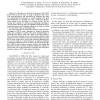Free Online Productivity Tools
i2Speak
i2Symbol
i2OCR
iTex2Img
iWeb2Print
iWeb2Shot
i2Type
iPdf2Split
iPdf2Merge
i2Bopomofo
i2Arabic
i2Style
i2Image
i2PDF
iLatex2Rtf
Sci2ools
115
click to vote
INFOCOM
2008
IEEE
2008
IEEE
On the Performance of IEEE 802.11 under Jamming
—In this paper, we study the performance of the IEEE 802.11 MAC protocol under a range of jammers that covers both channel-oblivious and channel-aware jamming. We study two channel-oblivious jammers: a periodic jammer that jams deterministically at a specified rate, and a memoryless jammer whose signals arrive according to a Poisson process. We also develop new models for channel-aware jamming, including a reactive jammer that only jams non-colliding transmissions and an omniscient jammer that optimally adjusts its strategy according to current states of the participating nodes. Our study comprises of a theoretical analysis of the saturation throughput of 802.11 under jamming, an extensive simulation study, and a testbed to conduct real world experimentation of jamming IEEE 802.11 using GNU Radio and USRP platform. In our theoretical analysis, we use a discrete-time Markov chain analysis to derive formulae for the saturation throughput of IEEE 802.11 under memoryless, reactive and o...
Related Content
| Added | 31 May 2010 |
| Updated | 31 May 2010 |
| Type | Conference |
| Year | 2008 |
| Where | INFOCOM |
| Authors | Emrah Bayraktaroglu, Christopher King, Xin Liu, Guevara Noubir, Rajmohan Rajaraman, Bishal Thapa |
Comments (0)

